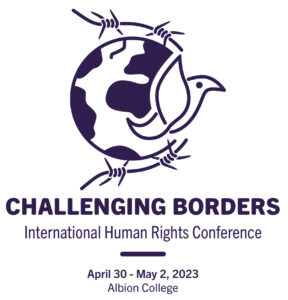Challenging Borders
April 30 – May 2, 2023 at Albion College
 The Challenging Borders in Domestic and International Human Rights conference welcomed faculty, students and practitioners who traveled from 9 countries and 3 American states representing 18 colleges and universities to challenge borders literal and symbolic in the field of human rights and to build cross campus connections.
The Challenging Borders in Domestic and International Human Rights conference welcomed faculty, students and practitioners who traveled from 9 countries and 3 American states representing 18 colleges and universities to challenge borders literal and symbolic in the field of human rights and to build cross campus connections.
Presenters addressed four themes: climate, identity rights, labor rights and refugee and migrant rights. The event engaged more than 100 people across 3 days including 45 students. We shared research, strategized advocacy tactics, explored the power of experiential learning, engaged the arts, and celebrated the joy that comes from building community. Thank you to the Great Lakes College Association Grand Challenge Initiative and the Mellon Foundation for their financial support.
Challenging the borders between the domestic and the international
Frequently, human rights are conceived in international terms with marginal attention directed to the ways that human rights issues manifest domestically. Yet human rights issues are all around us. If we look carefully, we can find them in our neighborhoods, on our college campuses and in our own closets. There are benefits to considering human rights as a framework for addressing domestic challenges like systemic racism, labor exploitation, immigration and environmental degradation. Additionally, many human rights challenges are transnational in scope. Refugees and migrants often cross international borders when their rights are violated domestically. The impacts of climate change disregard state sovereignty. In an increasingly interdependent world with a global economy, racial discrimination, and sex and labor exploitation are global problems. The impacts of environmental degradation are disproportionately suffered by marginalized populations. Transnational problems require responses at both the domestic and international level.
Challenging borders between categories of rights
Human rights are equal, interdependent and require universal protection. To say that human rights are interdependent is to say that the enjoyment of any single right or group of rights requires the enjoyment of other rights. This means that political and civil rights (e.g. the right to vote and freedom from discrimination) are necessary for formulating and fulfilling economic, social and cultural (ESC) needs (e.g. access to adequate housing, water, education and work). Similarly, violations of ESC rights limit our ability to exercise our political and civil rights. In short, human beings must possess the entire spectrum of human rights to lead a life of dignity. We welcome proposals that are conceptual — about the equal value of rights — and those that are applied illustrating interdependence in practice.
Topical areas of focus
Within the conference theme of challenging borders, we imagine four areas of focus:
- Identity rights, especially focusing on race, gender, ethnicity and sexuality;
- Labor rights;
- Refugee and migrant rights; and
- Environmental and climate rights.
We particularly encourage projects that work at the intersection of these areas – for example, projects on environmental racism or labor exploitation of immigrants. While we encourage submissions along these four themes, proposals on other human rights topics are also welcome.